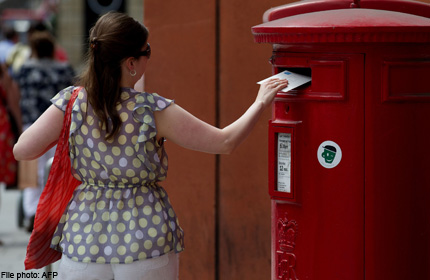
PARIS, France - There was a time when your local post office would mainly sell stamps and deliver letters. No longer.
To counteract the turmoil brought on by emails and text messages, postal services worldwide have reinvented themselves, taking on the technological revolution that once looked to cripple them.
Traditional snail mail service has dropped sharply in recent years, though emerging countries are a notable exception.
According to the Universal Postal Union (UPU), global letter- and light parcel delivery dropped by 3.7 per cent in 2011 from a year earlier, and by 5.1 per cent when just counting Europe and the former Soviet Union.
And the death of letter-writing has forced postal services to either catch on new trends or disappear.
Earlier this month, Britain announced plans to privatise more than half of Royal Mail in a bid to transform it into a modern communication business.
"This is logical, it is a commercial decision designed to put Royal Mail's future onto a long term sustainable basis," Britain's Business Secretary Vince Cable said.
"It is consistent with developments elsewhere in Europe where privatised operators in Austria, Germany and Belgium produce profit margins far higher than the Royal Mail but have continued to provide high quality and expanding services."

Amid the dwindling delivery numbers for letters and large packages, there is hope: parcels weighing less than two kilogrammes (4.4 pounds).
They "have seen an incredible growth thanks to Internet shopping," said Wendy Eitan of UPU.
The key, she said, is for postal services to take advantage of their reputed reliability and the trust they instill.
"In the eyes of the public, the postal service remains the trusted third party to certify electronic correspondence or to arrange the return of goods" linked to e-commerce, she said.
Online shopping, and the millions of parcels it generates, has become a boon for a new type of postal industry.
One of those players is Germany's Deutsche Post, which is investing 750 million euros (S$1.25 billion) in expanding its package delivery network by adding 20,000 new reception points.
Similarly, PostNord - Sweden and Denmark's merged postal services - is seeing a turnaround in its business thanks to its focus on online parcel delivery.
The same story can be told in Spain, where traditional mail delivery has plunged some 30 per cent in the past five years, and the national Correos has its mind set on "developing parcel activities with specific solutions and the value added by electronic commerce".
By 2020, Correos is determined to work along a business model "in which revenues do not exclusively come from the traditional postal business," a spokesman told AFP.
France's La Poste has taken it a step further. Aside from identifying parcels as "it's primary sector of development", it has also launched more than a dozen pilot projects exploring the possibilities of delivering medication to the elderly and to offer meter-readings for gas and electricity usage.
Bank operations and mobile telephony are other venues being explored. Italy's Poste Italiane today runs some six million deposit accounts and has sold around three million SIM cards for mobile telephones.
In Argentina, the Correo Oficial now offers the sale of mobile phone top-ups as well as tax payment services, describing itself as a modern organisation that offers "complex operations".
In 2015, Brazil's postal service plans to start selling mobile phone usage, with "the idea to have our own telephone brand."
In some countries, the postal services have dared to stray off the beaten track even further.
While the Finnish post office now offers sweets, toys and stationary at its counters, the US Postal Service likely tops the industry's innovation initiatives so far: next year it will launch clothes line based on its uniform under the banner "Rain, Heat & Snow".

